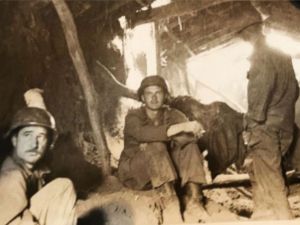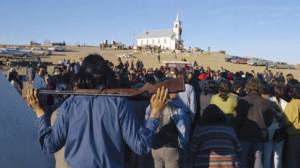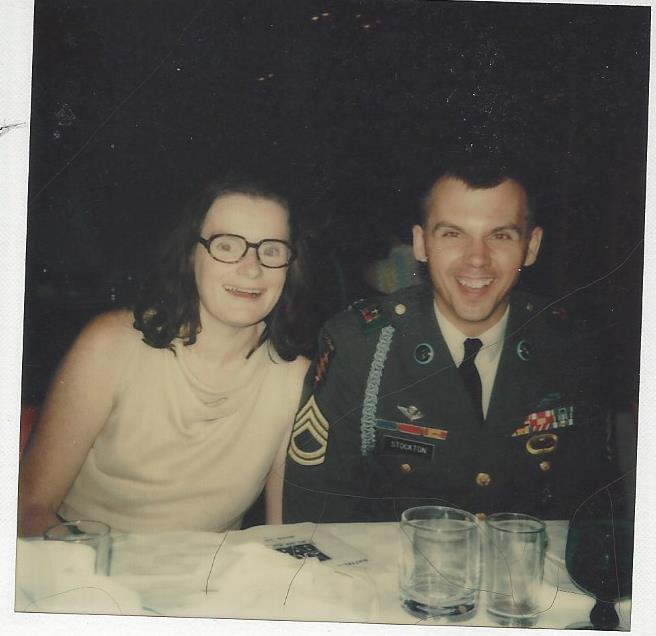This was originally published in The Belle Banner, Belle Missouri, on April 15th 2020.
In the Belle Banner, I titled this article “I Lost a Friend and so did the World”. I titled this blog as a eulogy because I saw that West Point did not yet have a eulogy posted for Volney Warner, so perhaps the USMA will a use find a use for this story.
 General Volney F. Warner Commander in Chief US Readiness Command 1981
General Volney F. Warner Commander in Chief US Readiness Command 1981
In December 1972, I was a staff sergeant in the 82nd Airborne Division. I got a call from a sergeant first class, whom I did not know, asking me to come to his office in the 82nd Airborne Division Command Section. Considering that he worked for the Division Chief of Staff and the Commanding General, I went to see him. He was offering me his job. He had been there two years and was burnt out. He told me about the high pressure, classified work, the 10 to 12 hour days, sometimes including weekends, and the balancing act of keeping three generals, a colonel, and the Division Command Sergeant Major happy. I told him that I didn’t think I wanted to do that. The next morning, my colonel called me to his office and said something like, “I guess I should have talked to you before you went over there.” In other words, I had already been picked.
Two stenographers worked for me, and my immediate boss was a major, the Secretary of the General Staff (SGS), and his boss (my endorser) was a full colonel, the Division Chief of Staff. That was Colonel Volney Frank Warner. He was congenial, always in a good mood, brilliant, common – no pretense, just a great guy and a great boss, from the first day. Always willing to take time to make sure that I understood what ever was happening, at the time. As time went by, I met Mrs. Warner, their two sons, and a daughter. The daughter I met, Valerie, was 16 at the time – and yes typical. An older daughter, Victoria, was away in college, and the two sons, James and Jerry, although a year apart in age, were in the same class at West Point, their first year. One of the boys had a rocky period, for a time, which took some of their dad’s telephone time.
Volney Warner grew up in Woonsocket, South Dakota. In his third year of high school, World War II was still on going, his father was head of the local draft board, and his mother the recorder, so he decided to relieve them of having to decide whether or not to draft their son, and joined the Navy. He had also applied for West Point, and after a little over a year in the Navy, he received an alternate South Dakota appointment to West Point. He graduated from West Point in 1950, and went home on leave, before reporting to the Infantry School at Fort Benning, Georgia, for the Basic Infantry Officer Course. While home on leave, the Korean War erupted. He didn’t go to Fort Benning, he went directly to Korea, and was assigned as a replacement infantry platoon leader, for one of the many lost. The US Army was not supplied, equipped, or trained, for combat, when North Korea invaded South Korea, and after China entered the war, the US Army sometimes faced enemy attacks of 500 to 1 in the enemy’s favor. Volney Warner said that during his year in Korea, his 100 man company suffered over 200 casualties as killed, wounded, or captured. They were unsupplied to the point that they stole chickens and butchered oxen for food. It was a miserable, kill or be killed introduction to the military.
 Lieutenant Volney F. Warner, Korea 1950
Lieutenant Volney F. Warner, Korea 1950
In 1963 he was assigned to Vietnam as a province advisor, in the Mekong Delta. The US had no combat troops in Vietnam, at that time, only advisors. It was during that tour that he and his counterparts came to realize that what was happening wasn’t just communist aggression, it was often neighbor against neighbor. More like a civil war. Back from Vietnam, he worked a couple years at the Southeast Asia Desk in the Pentagon, then as military assistant to the Special Assistant to the President on Vietnam, in the White House. He was part of what became a “think tank” on what to do in Vietnam, a course on which they could never agree. In 1969, as a colonel, he went back to Vietnam as a brigade commander. He said that, at that time it became a game. You did the best you could, even if you didn’t believe in it, so he tried to minimize casualties and do the best job possible.
Upon returning, that time, he was assigned as the executive to the Chief of Staff of the Army, General William C. Westmoreland. Army colonels get looked at four times in consideration for promotion to Brigadier General. If not selected during those four considerations, they will retire as colonels. Colonel Warner had been considered twice, and assuming that he had stepped on somebody’s toes, and been black balled from promotion, decided to retire, but his boss, General Westmoreland, convinced him to stay longer, and assigned him as the Chief of Staff of the 82nd Airborne Division.
He said, in later years, that when he arrived, the Commanding General (CG), Major General (MG) Frederick J. Krosen, who also attained four stars, told him; “I’m going in my office and do what I do, you go in your office and go to work, and in six months you’ll realize that you are running the division.”
I remember the day I started to realize that Col Warner really was a mental giant. We usually ran PT, then cleaned up and had staff call, which included about 15 members of the division staff, I sat in to record. That particular morning, during PT, we had tagged onto a company preparing for jungle school, and ran about six or seven miles. So, at staff call time we were still in shorts and T-shirts, soaked to the skin. The G2, the Intel people, had prepared a briefing on Unattended Ground Sensors, which were just being introduced. Col Warner sat, red faced, wiping sweat with a towel, listening to the briefing. At the end of their briefing, Col Warner ask about four or five questions which sent them back for days of research, such as, can we locate ourselves from those things, and can we triangulate their signals with ours and adjacent units to pin point us and them on the battlefield. Keep in mind, that was almost 50 years ago.
There are few people, in the world, who easily see through smoke and mirrors and BS, and can identify the real issue at hand. Volney Warner was very good at that. Alexander Haig was two years ahead of Volney Warner at West Point, then they had worked together at the pentagon and in the White House, and they and their families had become personal friends. President Nixon had promoted Al Haig from two to four stars, then pulled him in to be White House Chief of Staff. The Pine Ridge Indian Reservation in South Dakota was having an internal fight trying to impeach a corrupt leader. After failing to obtain a formal impeachment, on Tuesday February 27th 1973, about 200 Oglala Lakota and followers of the American Indian Movement (AIM) seized and occupied the town of Wounded Knee, on the reservation. Initially about 50 FBI agents descended on the town, surrounded it, and had police set up road blocks surrounding the town, and started arresting people leaving. In the first couple days, an FBI agent was shot and a couple Indians were killed. The FBI requested the Army’s help. On Friday morning, March 2nd 1973, Col Warner got a call from Al Haig, then White House Chief of Staff. It went something like this; “You are going to Wounded Knee to be the senior federal representative on site, everybody answers to you. Wear civilian clothes and pack for an extended stay. A plane will be at Bragg to pick you up in a few hours. Defuse the situation and don’t kill anybody.”
 FBI car shot during Wounded Knee
FBI car shot during Wounded Knee
The first thing was to change the FBI’s orders from “shoot to kill” to “shoot to wound”. Then with a paper topographic map, a compass and a pencil, he walked the ground to learn the terrain. He started trying to get the FBI and the Indians to talk. He would call back to our office at least once daily, with a detailed update which myself or one of the stenos would record on paper. He played little tricks, that the news never got wind of, to get the Indians to come out and talk. He brought in an Armored Personnel Carrier (APC) with a built in flame thrower. In front of the Indian positions, he set up a bunker, brought the APC up, and from 200 yards away, shot a flame that incinerated the bunker. The Indians finally agreed to talk. It was late April or early May before the situation at Wounded Knee was defused and Colonel Warner came home. In the first few days, he was visited by several top FBI people, who heaped praise on him for keeping them from doing something really bad.
 Negotiations between American Indian Movement and Federal Agents, Wounded Knee, 1973
Negotiations between American Indian Movement and Federal Agents, Wounded Knee, 1973
In late May, the Brigadier General board was also in session at the pentagon, which meant the fourth and final consideration for Col Warner. The first week of June, the CG, MG Krosen had a meeting of all the Brigade Commanders and Col Warner (all the colonels), in his office. During the meeting, the CG’s Aide got a call from Washington that the Brigadier list had just been released, and Col Warner was at the top of the list, to be promoted immediately. He was messaged a copy of the order. Not to reveal the surprise, the CG told the Aide to say that he forgot something, and get them all back to the office. One of the stenos got a star from one of the Brigadier’s Aide and pinned it on Col Warner’s cap, I grabbed a cloth star and Warner’s helmet and ran home, where Betty sewed it on the camouflage helmet cover. When all the colonels returned to the CG’s office, the CG opened the doors, so we could all see, he then said; “everyone come to attention”, the Aide read the order and MG Krosen pinned stars on then Brigadier General Warner’s collars. The colonels and generals then moved to MG Krosen’s house, to celebrate the promotion.
For the next year BG Warner was the Assistant Division Commander for Operations and Training. He said that when he asked MG Krosen what he wanted him to do, MG Krosen said; “You run the field, if I see you in your office, I know that you are not doing your job.” That year was like a marathon, I did a lot of communicating and movement coordinating for him, because it was often more than his Aide could handle. I remember an intense exercise when I had a couple jeeps, and three helicopters, carrying, waiting for, or moving to pick up BG Warner. When that year was over and he was moving on to another assignment, I typed a letter for him to the General Officers Branch at the Pentagon. In it, he said that if ever there was an opportunity for him to come back here, he would crawl through a mile of broken glass to get here. He said, these are the finest troops in the world, who do anything you ask of them.
BG Warner spent a year at Forces Command Headquarters, then was promoted to Major General and given command of the 9th Infantry Division at Fort Lewis, Washington, after which he was promoted to three stars and returned to Fort Bragg, as the XVIII Airborne Corps commander. In the summer of 1979, he was promoted to four star General, and given command of the US Readiness Command (which later became Central Command) at MacDill Air Force Base, Florida. He retired from the Army in 1981.
I talked to him, on the phone, just before he retired. There were rumors that he would be the next Chief of Staff of the Army, but his comment to me was; “when you get too far from the troops, there’s too much BS.”
 General (Retired) Volney F. Warner at a West Point interview 2008
General (Retired) Volney F. Warner at a West Point interview 2008
After retirement, he was hired as Vice President of Applied Technology for Vertex Systems, then established V.F. Warner and Associates Consulting in Washington, DC, which he managed until shortly before his death in November 2019. His family now runs the company.

I am GEN Warner’s grand-daughter, Valerie, and just came across this. He and my grandmother raised me. He never changed, and not a day goes by that I don’t miss him terribly. I appreciate you took the time to write this.
LikeLike
This is a wonderful, well-written eulogy that befits a great soldier like GEN Warner. I did not know the general but did see him once at Ft Bliss during a field exercise when I was a young officer. He looked every part a distinguished general officer with the four stars adorning his helmet and a white handled revolver in his holstered general’s belt. I remember staring at him in awe and thinking now there is a General, wow. RIP dear General, and thank you for the great tribute to a man who obviously meant a lot to you.
LikeLike